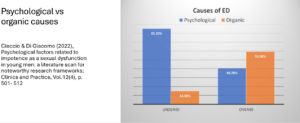Understanding the Rise of Sexual Dysfunction in Young Men: Exploring Psychosocial Factors and Psychosexual Therapy Solutions
Sexual dysfunctions are persistent, recurrent problems with sexual response, desire, orgasm, or pain that cause distress to the individual or the couple. The most common sexual presentation in men is erectile dysfunction (ED). For men above the age of 40, ED is explained organically, whereas for men below 40, it is psychologically understood.
In this article, Dr Remziye Kunelaki, an expert in the field, provides insights into the therapeutic strategies and considerations essential for effective intervention in this increasingly prevalent issue.
In recent years, there has been a significant increase in young men seeking medical treatment for issues such as erectile dysfunction, low libido, or problems with ejaculation.
The reason behind this increase is multifactorial and, in its majority, psychologically explained.
Some of the psychological factors that are behind the increase of young men presenting with sexual dysfunctions are:
Personal factors:
- Low/intolerance to failure
- Low/lack of self-esteem
- Strict religious upbringing
- Feeling emasculated
- Body image issues
- Perfectionism
Social factors:
- Feeling lonely and isolated
- Comparing self with peers
- Inner competition and pressure
Professional factors:
- Burnout at work
- Pressure to achieve
- Competitiveness
Relational factors:
- Lack of sexual attraction towards their partner
- Difficulties with commitment
- Difficulties with connection and focus
- Avoidant attachment styles
- Earlier childhood trauma
Psychosexual therapy provides the opportunity for the factors above to be identified for each patient and then explored and addressed further.
Some of the areas psychosexual therapy can help with younger men are:
- Providing psychoeducation
- Addressing issues in childhood
- Exploring relationships with others and self
- Encouraging self-care
- Instructing exercises to explore the body.
- Normalising trial and error in sex
- Reminding that sex is about fun and joy.
- Working in a multidisciplinary manner with medical care
Initially, having an assessment consultation by a physician, such as a urologist, is helpful in excluding any potentially organic factors, which are rare in younger men. Psychosexual therapy could provide a safe space to explore and sometimes resolve the psychogenic reasons that contribute to sexual dysfunction.
Therapy can work both in a time-limited and longer-term framework. The length and frequency of sessions are usually indicated at the end of the first consultation when a complete history is taken, and a personalised treatment formulation is provided. Depending on one’s financial budget and openness to reflection, therapy could be adjusted to each patient’s needs and circumstances. The most significant contribution to a good experience in therapy is the relationship between client and therapist. Good rapport between therapist and client is essential in psychosexual therapy due to the nature and sensitivity of the problems discussed.
About Dr Remziye Kunelaki
Dr Remziye Kunelaki is a psychologist—sexologist. She has almost 20 years of experience in the NHS in significant university hospitals managing psychosexual services. Her PhD is on sexuality and religion. She is a senior accredited psychosexual therapist by The College of Sexual and Relationship Therapists and registered as a psychotherapist by the UK Council of Psychotherapy. She is a committee member of the British Society of Sexual Medicine. She sits on the examination board of the European Society for Sexual Medicine for the certification of psycho-sexologists. She offers therapy in English, Turkish and Greek. She works with individuals and couples.
To find out more about Dr Kunelaki and to book an appointment, please click here.





